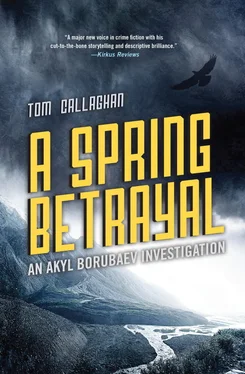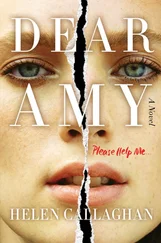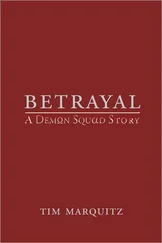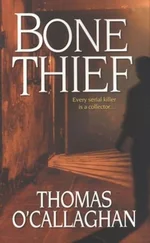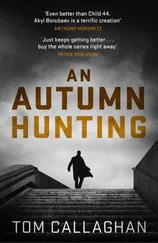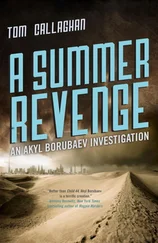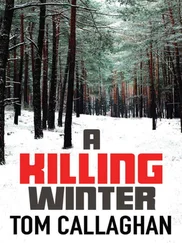I spent ten minutes making a comprehensive record of the blood spatter on the walls, the straps stained from scraped and torn skin, wood darkened from tears and spit and vomit. I forced my mind to ignore the horror of what we had found. I needed evidence. And after that, I wanted revenge.
I looked at the lenses on the shelf. Nikon, expensive stuff, nothing but the best for child pornographers. Next to the chisels and scrapers and pliers, some of them bloodstained, there was a screw-top glass jar. I held it up to the light, gave a gasp of disgust, almost dropped it. Instead, I put it back on the shelf, wiped my fingers on my trousers. But I couldn’t wipe away the sense of having touched something vile, corrupt and corrupting.
“Fingernails,” I said, my throat sour with bile, “and fingers.”
I gave a final look around the room, saw a waist-high cupboard in the far corner. A heavy chain and padlock secured the two doors. I rapped a knuckle on the top, heard something move inside.
“Saltanat,” I whispered, my heart performing a manic tango. “There’s something inside. Something alive.”
I aimed my gun, as Saltanat used the picks on the padlock. After what seemed several days, she pulled the chain away and opened the cupboard.
A small boy, about eight years old, cowered away from us as far as he could, eyes wide with terror. His face was bruised, or dirty, and his clothes looked ragged. As he stared out at us, he started to cry, doing his best to stifle the sobs. Something about the rough haircut was familiar, then I realized. Otabek, from the orphanage.
Saltanat reached out a hand, and he flinched. She smiled, spoke softly, words of comfort, what a brave boy he was, we were the police, he was safe now. I put my gun away, smiled as best I could.
“We need to get out of here,” I said. “We haven’t bought ourselves that much time.”
She paid no notice, continued to reassure the boy, calming him, asking if he was hungry, if he was tired, would he like a nice bed of his own to sleep in.
Slowly, a kind of trust replaced the fear in his eyes, and he took Saltanat’s hand. She helped him out of the cupboard, never taking her eyes off his face. As he stood up, I could see dark bruises on his arms and legs, and pity and anger made my head spin.
I stood at the bottom of the stairs, listening for a car engine, hoping we would be able to leave before then, hoping they’d return so I could kill them.
Saltanat crouched down, her face at a level with the boy’s, speaking softly. He whispered something in her ear, and she turned to me, her face feral with anger.
“He says his name is Otabek,” she told me, with a voice of sharpened steel.
“ Privyat , Otabek,” I said. “Do you remember meeting me at the orphanage? Director Shokhumorov’s friend?”
He stared at me, nodded briefly, a single jerk of the head, whispered something to Saltanat, never letting go of her hand as they walked toward the stairs. Her face was that of a goddess, vengeful and merciless, carved from stone. Only God could help whoever had done this.
“He wants to know,” Saltanat said, and at that moment, she was terrifying, “are you going to kill the bad men?”
I nodded, never taking my eyes off the orphanage identity band on his left wrist.
The three of us left the basement, went back outside, stopping only to snatch up a pile of papers on the kitchen table. I stuffed the papers into my jacket pocket, wondered about exploring the rest of the house, but we’d spent too much time in there as it was. And I had no stomach for whatever might be tucked away in the other rooms.
Saltanat locked the outer door as efficiently as she’d opened it, and we made our way back to the door in the wall. We were only just in time; as we reached the cover of the trees, the steel gates slowly swung open, powerful headlights illuminating the house and throwing long shadows across the wall.
“Don’t move,” I whispered, but Saltanat had already dropped to the ground, her face turned away, pushing Otabek to the ground. The people carrier trundled through the gates, which closed behind it. Two no-necks got out and looked around. Basic security, but we were still trapped. I knew our best chance of remaining undetected was to stay still. It’s movement that catches the eye of someone looking around, and it was dark enough under the trees for me to think we had a pretty good chance of getting away.
The Voice was still in the people carrier, and I saw a flash of light, as if someone was making a call on their mobile. Then the iPhone in my pocket started to ring.
The response of the bodyguards to the sound of the mobile going off was immediate. Unable to locate the exact source of the ringing, they dropped to the ground, unslinging their guns from their shoulders. I knew we had maybe two or three seconds before the Uzis opened up, and emptied their magazines in our direction.
“Run for the door,” I told Saltanat, “and leave it half open.”
She nodded and ran in a half-crouch, clutching Otabek’s hand, hardly visible but enough to turn the bodyguards in our direction. I scuttled to the cover of the nearest tree, not very dignified, but a lot better than being perforated. I looked down the barrel of my gun toward the people carrier, and started firing. I didn’t aim for any particular target, but with any luck the heavy caliber bullets slamming into the car would buy us a few seconds.
Almost at once, the Uzis began their horrible staccato cough, like watch dogs with bronchitis, and fragments of brick from the wall behind me spattered the back of my jacket and neck. But in their surprise they were aiming high, and the only casualty was the tree in front of me. That couldn’t last though, and I had to move.
I rolled over, cursing as the stitches in my shoulder tore. There was a pause and relative silence as the Uzis ran out of bullets, and I took advantage by scrambling through the door and away from my new role as target practice.
Saltanat was driving toward me, headlights rising and falling as she rode up onto the pavement. I dived toward the passenger door and hauled myself in as the Uzis started up again. I was out of bullets, and Saltanat thrust her Makarov into my hand. I emptied the clip through the open doorway and then we were halfway down the road.
I looked back to see if the people carrier was following us, but a quick left then a ferocious right hid the house from view. Saltanat swerved into a narrow alleyway and a half-skid, sending me slamming into the windshield. Two more sharp corners and then we were running parallel to Chui Prospekt.
I sat back and fastened my seat belt. In the side mirror, I could see the dark smudge of a bruise already beginning to form on my forehead. Together with the blood ruining my jacket, I looked like shit. Saltanat was as cool and collected as ever, though her hand gave the slightest of tremors as she changed gears.
Finally we parked by the side of the Metro Bar.
“I want a drink,” Saltanat said, “and you’re coming with me.”
We reloaded our guns, walked into the bar arm in arm, an innocent couple out for an evening stroll with their son.
The Metro used to be a puppet theater a long time ago, the high ceiling and elaborate glass-paneled bar a testimony to more affluent days. The foreigners who came here when it was known as the American Bar have mainly gone home to count their tax-free earnings, leaving only a few eccentrics who are on the run from either their country’s police or embittered ex-wives.
Saltanat disappeared to the toilets downstairs with Otabek, and I waited until they emerged, his face now clean but still scared and distrustful. A pretty Kyrgyz waitress with bleach-blond hair and a crop top showing her navel ring came over to serve us.
Читать дальше
